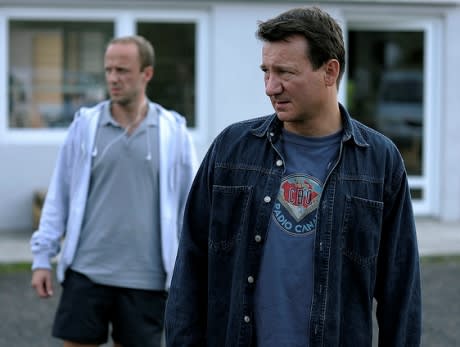Though titled Courage, referencing thrill-seeker Alfred's (Robert Wieckiewicz) inability to step in and help as his brother Jerzy (Lukasz Simlat) was assaulted and thrown from a moving train by four thugs, television veteran Greg Zglinski's engrossing character drama is more about the aftereffects of violent acts.
Initially shown risking his brother's life by dodging in front of a train—the very commuter train that will later damage him in an entirely different manner—Alfred's character arc is a bit of a cliché, exaggerated to juxtapose self-imposed confidence with the practical application of such. Even his casual demeanor and attire are mirrored with his brother's more professional and progressive social presentation to draw a parallel between modernity and traditionalism—or boyhood and manhood—with Jerzy wanting to push their internet company forward and Fred remaining satisfied with the status quo.
The violent act, which occurs early in the film, suggests Cain and Abel overtones, with Alfred's inability to act—though, how much he would have been able to help is debatable—being open to interpretation: Was he frozen by shock or was his inaction passive-aggressive jealousy manifested in situational deliberateness?
The implication that Alfred was somehow fueled by envy is eventually overshadowed by the overwhelming reaction to the event, with an internet video (Get it? They own an internet company.) popping up to reveal our protagonist's cowardice to his friends and family who respond with cruel judgment. Unable to visit his brother in the hospital and reiterating his jealous characteristics when his wife tends to her brother-in-law and his children in his absence, the moody entrepreneur spends most of the runtime seeking down the men that attacked his brother.
How people grieve and respond to a situation they weren't involved in drives most of the narrative, with Alfred's wife, employees and father doling out snarky remarks and dirty looks without asking for context or understanding the experience first-hand. Everyone looks for someone to blame in the situation, responding to the chaos and unpredictability of a world where anything can happen at any time regardless of how cautious (Jerzy jogs daily) and mature (he's also a responsible family man) someone is, with panic, defensiveness and misguided hostility.
Even though the callous reception of Alfred by friends and family is somewhat exaggerated for thematic importance, the overall examination of violence in society and the post-assessment of such is quite astute. With some evening out of the broader juxtapositions (the aforementioned thrill-seeking freezing when presented with a fight), Zglinski's well-acted and even-handed drama could easily have help up against Thomas Vinterberg's The Hunt as a brilliant analysis of social values projected onto a situation, or individual in need, with morality, rather than logic, in mind.
Courage screens on Thursday, November 22nd at 6pm at the Royal.
(Opus Film)Initially shown risking his brother's life by dodging in front of a train—the very commuter train that will later damage him in an entirely different manner—Alfred's character arc is a bit of a cliché, exaggerated to juxtapose self-imposed confidence with the practical application of such. Even his casual demeanor and attire are mirrored with his brother's more professional and progressive social presentation to draw a parallel between modernity and traditionalism—or boyhood and manhood—with Jerzy wanting to push their internet company forward and Fred remaining satisfied with the status quo.
The violent act, which occurs early in the film, suggests Cain and Abel overtones, with Alfred's inability to act—though, how much he would have been able to help is debatable—being open to interpretation: Was he frozen by shock or was his inaction passive-aggressive jealousy manifested in situational deliberateness?
The implication that Alfred was somehow fueled by envy is eventually overshadowed by the overwhelming reaction to the event, with an internet video (Get it? They own an internet company.) popping up to reveal our protagonist's cowardice to his friends and family who respond with cruel judgment. Unable to visit his brother in the hospital and reiterating his jealous characteristics when his wife tends to her brother-in-law and his children in his absence, the moody entrepreneur spends most of the runtime seeking down the men that attacked his brother.
How people grieve and respond to a situation they weren't involved in drives most of the narrative, with Alfred's wife, employees and father doling out snarky remarks and dirty looks without asking for context or understanding the experience first-hand. Everyone looks for someone to blame in the situation, responding to the chaos and unpredictability of a world where anything can happen at any time regardless of how cautious (Jerzy jogs daily) and mature (he's also a responsible family man) someone is, with panic, defensiveness and misguided hostility.
Even though the callous reception of Alfred by friends and family is somewhat exaggerated for thematic importance, the overall examination of violence in society and the post-assessment of such is quite astute. With some evening out of the broader juxtapositions (the aforementioned thrill-seeking freezing when presented with a fight), Zglinski's well-acted and even-handed drama could easily have help up against Thomas Vinterberg's The Hunt as a brilliant analysis of social values projected onto a situation, or individual in need, with morality, rather than logic, in mind.
Courage screens on Thursday, November 22nd at 6pm at the Royal.
